CORRUPTION CPS: Why is the CPS 'Chief Administrative Officer' Tim Cawley still in power? Why was the former Motorola executive ever a major city school administrator? A closer look at how the seven members of the Chicago Board of Education script and implement their corruption...
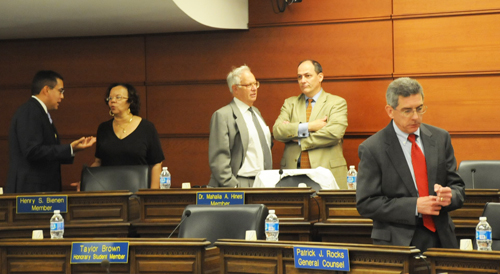 By the time they met for their first full Board of Education meeting on June 22, 2015, the seven members of the "new Board" appointed by Mayor Rahm Emanuel had already met and voted on a key issue. At a special meeting on June 15, 2011, the Board members voted that they could not "reasonably foresee" being able to pay a four percent raise for the fifth year of the five-year contract with the Chicago Teachers Union. The Board claim that it didn't have the dollars proved to be a lie, as they ended that fiscal year July 1, 2011 through June 30, 2012) with more than a half billion dollar surplus! In May 2015, the Board made the same claim -- saying "But this time IT'S TRUE!" -- in announcing that they did not have enough money to offer the Chicago Teachers Union a three percent raise (at an estimated cost of $100 million in a $5 billion budget) to extend the existing contract until June 30, 2016. The current contract expires on June 30, 2015. Above, three of the four members of the Board in the above photo are still in power. Left to right, Board members Jesse Ruiz, Mahalia Hines, Henry Bienen, and Rodrigo Sierra. In the foreground is Board Attorney Patrick Rocks, who certified hundreds of times before his 2012 retirement that the Board actions were legal. Substance photo by George N. Schmidt. Since 2011, the so-called "Chief Administrative Officer" of the nation's third largest school system, Tim Cawley, has been behind many -- if not most -- of the most egregious attacks on public education in Chicago. Cawley's signature and Power Point presentation were responsible (along with the unanimous vote of the members of the Chicago Board of Education) for the costly and ineffective contracts for school custodial work to Aramark and Sodexo-MAGIC. Cawley's former employer, the Academy for Urban School Leadership (AUSL), is responsible for one of the biggest ongoing frauds in education -- "turnaround."
By the time they met for their first full Board of Education meeting on June 22, 2015, the seven members of the "new Board" appointed by Mayor Rahm Emanuel had already met and voted on a key issue. At a special meeting on June 15, 2011, the Board members voted that they could not "reasonably foresee" being able to pay a four percent raise for the fifth year of the five-year contract with the Chicago Teachers Union. The Board claim that it didn't have the dollars proved to be a lie, as they ended that fiscal year July 1, 2011 through June 30, 2012) with more than a half billion dollar surplus! In May 2015, the Board made the same claim -- saying "But this time IT'S TRUE!" -- in announcing that they did not have enough money to offer the Chicago Teachers Union a three percent raise (at an estimated cost of $100 million in a $5 billion budget) to extend the existing contract until June 30, 2016. The current contract expires on June 30, 2015. Above, three of the four members of the Board in the above photo are still in power. Left to right, Board members Jesse Ruiz, Mahalia Hines, Henry Bienen, and Rodrigo Sierra. In the foreground is Board Attorney Patrick Rocks, who certified hundreds of times before his 2012 retirement that the Board actions were legal. Substance photo by George N. Schmidt. Since 2011, the so-called "Chief Administrative Officer" of the nation's third largest school system, Tim Cawley, has been behind many -- if not most -- of the most egregious attacks on public education in Chicago. Cawley's signature and Power Point presentation were responsible (along with the unanimous vote of the members of the Chicago Board of Education) for the costly and ineffective contracts for school custodial work to Aramark and Sodexo-MAGIC. Cawley's former employer, the Academy for Urban School Leadership (AUSL), is responsible for one of the biggest ongoing frauds in education -- "turnaround." 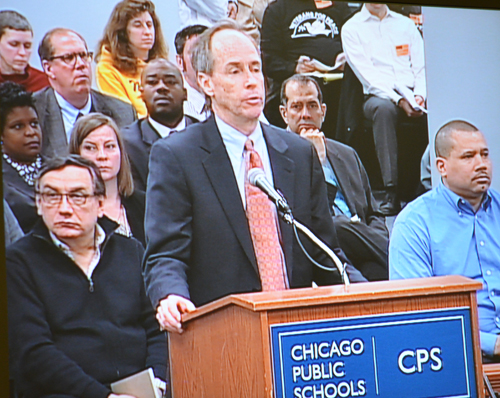 The Chief Administrative Officer of Chicago Public Schools, Tim Cawley, presented the now-infamous proposal to the Board that Aramark and Sodexo-MAGIC be given virtually complete control over the custodial work in the nation's third largest school system. Cawley's carefully scripted Power Point was followed by the ritual of self-congratulatory questions by the members of the Board of Education, and then the Board members voted to approve the re-privatization contracts unanimously -- without real debate. (Substance photo from the February 26, 2014 meeting of the Board of Education by George N. Schmidt) And now that Barbara Byrd Bennett's corruption and cronyism have forced her to take a paid leave (at a quarter million dollar a year salary), Cawley's recommendations are foremost in front of the Board of Education members. On June 22, 2011, the Board approved a Board Report establishing that Cawley's decisions beginning on May 17, 2011, were OK. In fact, Cawley, not Barbara Byrd Bennett has been the most consistent exemplar of the actual policies of CPS.
The Chief Administrative Officer of Chicago Public Schools, Tim Cawley, presented the now-infamous proposal to the Board that Aramark and Sodexo-MAGIC be given virtually complete control over the custodial work in the nation's third largest school system. Cawley's carefully scripted Power Point was followed by the ritual of self-congratulatory questions by the members of the Board of Education, and then the Board members voted to approve the re-privatization contracts unanimously -- without real debate. (Substance photo from the February 26, 2014 meeting of the Board of Education by George N. Schmidt) And now that Barbara Byrd Bennett's corruption and cronyism have forced her to take a paid leave (at a quarter million dollar a year salary), Cawley's recommendations are foremost in front of the Board of Education members. On June 22, 2011, the Board approved a Board Report establishing that Cawley's decisions beginning on May 17, 2011, were OK. In fact, Cawley, not Barbara Byrd Bennett has been the most consistent exemplar of the actual policies of CPS.
Any historical review of Cawley's four years in power indicates that the Board members are still trying to cover up what's left of the mess they have created, at enormous expense, at CPS. While the re-privatization contracts for CPS custodial services are the most public examples of Cawley's cynical incompetence, there are many others which are still being covered up by official and unofficial CPS actions.
When the members of the Chicago Board of Education voted to hire Tim Cawley at their June 22, 2011 meeting, they voted to pay him the second highest annual salary of any officer at CPS. Note also that in the Board Report that they voted for hiring Cawley, the Board members also granted Cawley a "special needs waiver pursuant to the Policy." The Board didn't say what the "Policy" was or why Cawley needed a "special needs waiver." It later came out that Cawley was allowed to continue living in Winnetka, despite the fact that CPS was firing teachers and principals on a regular basis for violating the Board's "Residency Policy." The annual salary of the new "Chief Executive Officer" (at that time, Jean Claude Brizard) was set at $250,000 per year. The salary of the "Chief Administrative Officer" (Cawley) was set at $215,000 per year. Both were to receive "performance bonuses" (which CPS has kept secret now for four years). Brizard received "relocation expenses" of $30,000 to move here from Rochester. Because Cawley already lived in the most expensive suburbs north of Chicago, that was not in his original deal.
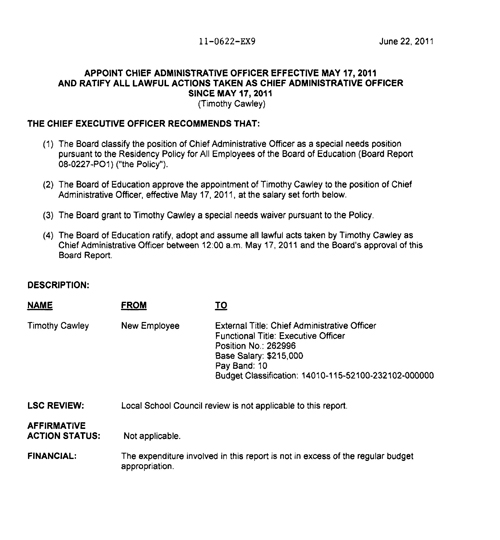 When the members of the Chicago Board of Education voted to hire Tim Cawley at their June 22, 2011 meeting, they voted to pay him the second highest annual salary of any officer at CPS. Note also that in the Board Report that they voted for hiring Cawley, the Board members also granted Cawley a "special needs waiver pursuant to the Policy." The Board didn't say what the "Policy" was or why Cawley needed a "special needs waiver." It later came out that Cawley was allowed to continue living in Winnetka, despite the fact that CPS was firing teachers and principals on a regular basis for violating the Board's "Residency Policy." In May 2011, Rahm Emanuel had gotten rid of all the previous members of the Board of Education, who had been appointed by Mayor Richard M. Daley. By that time, Daley's appointed "Chief Executive Officer" Ron Huberman had left, and the school system was being headed by an "Interim CEO," Terry Mazany of the Chicago Community Trust.
When the members of the Chicago Board of Education voted to hire Tim Cawley at their June 22, 2011 meeting, they voted to pay him the second highest annual salary of any officer at CPS. Note also that in the Board Report that they voted for hiring Cawley, the Board members also granted Cawley a "special needs waiver pursuant to the Policy." The Board didn't say what the "Policy" was or why Cawley needed a "special needs waiver." It later came out that Cawley was allowed to continue living in Winnetka, despite the fact that CPS was firing teachers and principals on a regular basis for violating the Board's "Residency Policy." In May 2011, Rahm Emanuel had gotten rid of all the previous members of the Board of Education, who had been appointed by Mayor Richard M. Daley. By that time, Daley's appointed "Chief Executive Officer" Ron Huberman had left, and the school system was being headed by an "Interim CEO," Terry Mazany of the Chicago Community Trust.
The seven members of the Board appointed by Emanuel were all "free market" zealots dedicated to the massive privatization of the nation's third largest school system.
Their initial appointments to executive positions included some people who might have believed their job was to improve the city's public schools, rather than replace those real public schools with as many charter schools as possible. The result was that over the next 18 months, many of the initial executives hired by the Board were replaced by others who were more prepared to dedicate their work to the destruction of the city's public education system and the implementaation of a semi-privatized system, where as many public dollars as possible went into the pockets of private contractros, ranging from the charter school companies to major corporate players like Aramark and Sodexo- MAGIC.
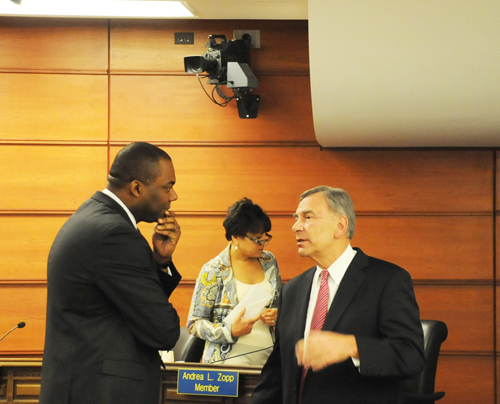 By the time the newly appointed Chicago Board of Education met for its first full meeting on June 22, 2011 (above), the Board had already made clear that it was going to launch a concerted attack on the Chicago Teachers Union. At its special meeting of June 15, 2011, the Board voted that it did not have sufficient funds to pay a four percent raise that would have been due to the teachers and other union workers at CPS during the fifth year of the five-year contract (July 1, 2011 through June 30, 2012). The Board members and the newly appointed "Chief Executive Officer" Jean-Claude Brizard smiled a lot, but made clear that they were willing to lie and dissemble in order to promote massive privatization of the city's public schools and the attacks that have been standard on the Chicago Teachers Union since they took power. Above, just prior to the beginning of the June 22, 2011 meeting, Jean-Claude Brizard talks with Board President David Vitale while Penny Pritzker lurks in the background. Substance photo by George N. Schmidt.By the time the Chicago Board of Education appointed by Mayor Rahm Emanuel met for its first regular meeting on June 22, 2011, it would begin to become clear to some reporters and close observers that Rahm had appointed a Board -- and administrative staff -- who intended to pursue an agenda that could only be characterized as "revolutionary." The seven members of the Board conformed to what this reporter and others began calling "Rahm's Rainbow" -- a racially, ethnically, and sexually diverse group that would be able to answer any questions regarding the mayor's commitment to so-called "diversity politics."
By the time the newly appointed Chicago Board of Education met for its first full meeting on June 22, 2011 (above), the Board had already made clear that it was going to launch a concerted attack on the Chicago Teachers Union. At its special meeting of June 15, 2011, the Board voted that it did not have sufficient funds to pay a four percent raise that would have been due to the teachers and other union workers at CPS during the fifth year of the five-year contract (July 1, 2011 through June 30, 2012). The Board members and the newly appointed "Chief Executive Officer" Jean-Claude Brizard smiled a lot, but made clear that they were willing to lie and dissemble in order to promote massive privatization of the city's public schools and the attacks that have been standard on the Chicago Teachers Union since they took power. Above, just prior to the beginning of the June 22, 2011 meeting, Jean-Claude Brizard talks with Board President David Vitale while Penny Pritzker lurks in the background. Substance photo by George N. Schmidt.By the time the Chicago Board of Education appointed by Mayor Rahm Emanuel met for its first regular meeting on June 22, 2011, it would begin to become clear to some reporters and close observers that Rahm had appointed a Board -- and administrative staff -- who intended to pursue an agenda that could only be characterized as "revolutionary." The seven members of the Board conformed to what this reporter and others began calling "Rahm's Rainbow" -- a racially, ethnically, and sexually diverse group that would be able to answer any questions regarding the mayor's commitment to so-called "diversity politics."
What the seven members of the Board had that was homogeneous was a ruthless commitment to a massive program of union-busting and privatization. All seven members of the Board began in June 2011 to promote those policies -- and to hire those executives -- that would undermine the power of the unions and push a powerful agenda of corporate "school reform." The reform was based on a bottom line approach to school evaluations that fundamentally altered the historical bond between schools and communities, and pushed the so-called "business model" of corporate reform. Under that model, schools had to be reduced to locations that produced a set of numbers (it was called "data driven management") that could be evaluated as simplistically as if public schools in the United States of America were producing cell phones or screws. Cawley, who had previously been in middle management at Motorola, was probably one of the best men for that kind of job, since his entire career had little to do with education and everything to do with the businesses of "business."
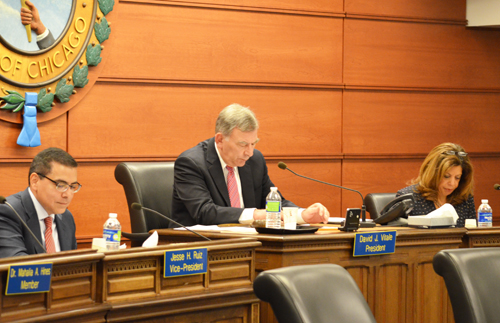 The three most important members of the Chicago Board of Education who remain in power from 2011 through May 1, 2015 are Board Vice President Jesse Ruiz (above left), Board President David Vitale (center) and Board Member Andrea Zopp. Along with the other four members of the Board (two of whom have changed), Ruiz, Zopp and Vitale fulfilled the "diversity" requirement for "Rahm's Rainbow." What became clear within the first six months of their governance over the nation's third largest school system was that while racially diverse, they were ideologically homogeneous. All practice a ruthless anti-union strategy with massive privatization behind many smokesscreens, including a rhetoric of "choice" and claims that all of their actions were only motivated by what was best for the children of Chicago. Reduced to their essence, however, any of the members of the Chicago Board of Education after June 2011 could have emerged from an Ayn Rand novel, at work with John Galt to provide a final solution to the union problem and achieve a masterpiece of privatization and the transfer of hundreds of millions of dollars in public funds into private corporate hands. The above photo was taken at the June 2013 meeting of the Chicago Board of Education. Substance photo by George N. Schmidt. Cawley, of course, was not alone, and was not even the top man or the highest paid executive at CPS. In salary, he was Number Two, behind Jean-Claude Brizard, the "Chief Executive Officer." Cawley's position as "Chief Administrative Officer" (a job not know in most corporations, where the second in command is usually the "Chief Operations Officer" or the Chief of Staff) had been a throwaway position in CPS prior to the Rahm Revolution. The position was not even defined clearly, and its powers only became more and more clear to those inside the system as the Board of Education routinely worked to push its business and privatization model for public education in Chicago.
The three most important members of the Chicago Board of Education who remain in power from 2011 through May 1, 2015 are Board Vice President Jesse Ruiz (above left), Board President David Vitale (center) and Board Member Andrea Zopp. Along with the other four members of the Board (two of whom have changed), Ruiz, Zopp and Vitale fulfilled the "diversity" requirement for "Rahm's Rainbow." What became clear within the first six months of their governance over the nation's third largest school system was that while racially diverse, they were ideologically homogeneous. All practice a ruthless anti-union strategy with massive privatization behind many smokesscreens, including a rhetoric of "choice" and claims that all of their actions were only motivated by what was best for the children of Chicago. Reduced to their essence, however, any of the members of the Chicago Board of Education after June 2011 could have emerged from an Ayn Rand novel, at work with John Galt to provide a final solution to the union problem and achieve a masterpiece of privatization and the transfer of hundreds of millions of dollars in public funds into private corporate hands. The above photo was taken at the June 2013 meeting of the Chicago Board of Education. Substance photo by George N. Schmidt. Cawley, of course, was not alone, and was not even the top man or the highest paid executive at CPS. In salary, he was Number Two, behind Jean-Claude Brizard, the "Chief Executive Officer." Cawley's position as "Chief Administrative Officer" (a job not know in most corporations, where the second in command is usually the "Chief Operations Officer" or the Chief of Staff) had been a throwaway position in CPS prior to the Rahm Revolution. The position was not even defined clearly, and its powers only became more and more clear to those inside the system as the Board of Education routinely worked to push its business and privatization model for public education in Chicago.
Four top executives were hired at the June 22, 2011 Board meeting, with dozens more to come during the coming months. The Board members did not discuss the unusual details of some of those decisions. For example, none of the Board members raised any public questions at the Board meeting when the Board voted to hire Noemi Donoso, a mid-level bureaucrat who had specialized in charter schools in Colorado, to be "Chief Education Officer." Although the "Chief Education Officer" was supposedly the second most important official at CPS, and had responsibility to oversee the actual working of the schools, Donoso was obviously less important than Cawley.
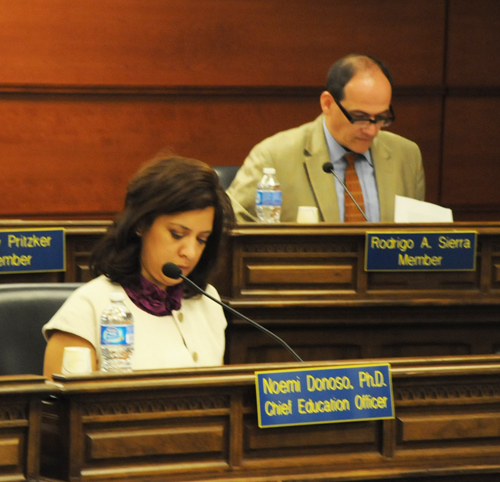 None of the Board members raised any public questions at the June 22, 2011 Board meeting (above) when the Board voted to hire Noemi Donoso, a mid-level bureaucrat who had specialized in charter schools in Colorado, to be "Chief Education Officer" despite the fact that Donoso's annual salary was slated to be $20,000 a year less than the "Chief Administrative Officer" would receive. Donoso's role at CPS diminished over the next two years, until she finally left. The position of Chief Education Officer was never filled. Behind Donoso in the above picture from June 22, 2011 is Board member Rodrigo Sierra, who also provided some of the diversity that Rahm Emanuel required. Sierra was replaced on the Board by former principal Carlos Azcoitia, who is still serving. Substance photo by George N. Schmidt.According to the Board Report which the Board members voted in favor of at that meeting, Donoso's annual salary was slated to be $20,000 a year less than the "Chief Administrative Officer" would receive. She was also given $21,000 in relocation and transition expenses. Although she was displayed prominently by Rahm Emanuel for a time during public events, Donoso's role at CPS diminished over the next two years, until she finally left. The position of "Chief Education Officer" was never filled after that, and public discussion of the reason was limited to questions raised by Substance.
None of the Board members raised any public questions at the June 22, 2011 Board meeting (above) when the Board voted to hire Noemi Donoso, a mid-level bureaucrat who had specialized in charter schools in Colorado, to be "Chief Education Officer" despite the fact that Donoso's annual salary was slated to be $20,000 a year less than the "Chief Administrative Officer" would receive. Donoso's role at CPS diminished over the next two years, until she finally left. The position of Chief Education Officer was never filled. Behind Donoso in the above picture from June 22, 2011 is Board member Rodrigo Sierra, who also provided some of the diversity that Rahm Emanuel required. Sierra was replaced on the Board by former principal Carlos Azcoitia, who is still serving. Substance photo by George N. Schmidt.According to the Board Report which the Board members voted in favor of at that meeting, Donoso's annual salary was slated to be $20,000 a year less than the "Chief Administrative Officer" would receive. She was also given $21,000 in relocation and transition expenses. Although she was displayed prominently by Rahm Emanuel for a time during public events, Donoso's role at CPS diminished over the next two years, until she finally left. The position of "Chief Education Officer" was never filled after that, and public discussion of the reason was limited to questions raised by Substance.
Rahm Emanuel had appointed seven people to the Board of Education, completely replacing the Board members who had been serving under his predecessor, Richard M. Daley. For President of the Board, Emanuel chose banker David Vitale. The Vice President was wealthy lawyer Jesse Ruiz. The other Board members were Henry Bienen, Mahalia Hines, Penny Pritzker, Rodrigo Sierra, and Andrea Zopp.


By: Rod Estvan
Tim Cawley incompetent?
There is no question that Mr. Cawley often reeks cynicism, particularly at CPS budget hearings where he has gone out of his way to incite audiences. But incompetent I don't know about that.
Assuming the objective of the CPS Board is to reduce union power, one has to admit Mr. Cawley has effectively implemented that objective. Moreover he helped coopt SEIU Local 73 and separated those workers off during CTU's last strike. That was not incompetent.
Mr. Cawley also worked closely with Jim Franczek, in the 2012 contract development to reduce the scope of that contract. Effectively Cawley and Franczek used the hard cop/soft cope routine. Cawley also was a critical factor in the school closing process which withstood all legal challenges and did achieve it nefarious goal.
One could call Mr. Cawley many names but incompetent probably should not be among them.
Rod Estvan